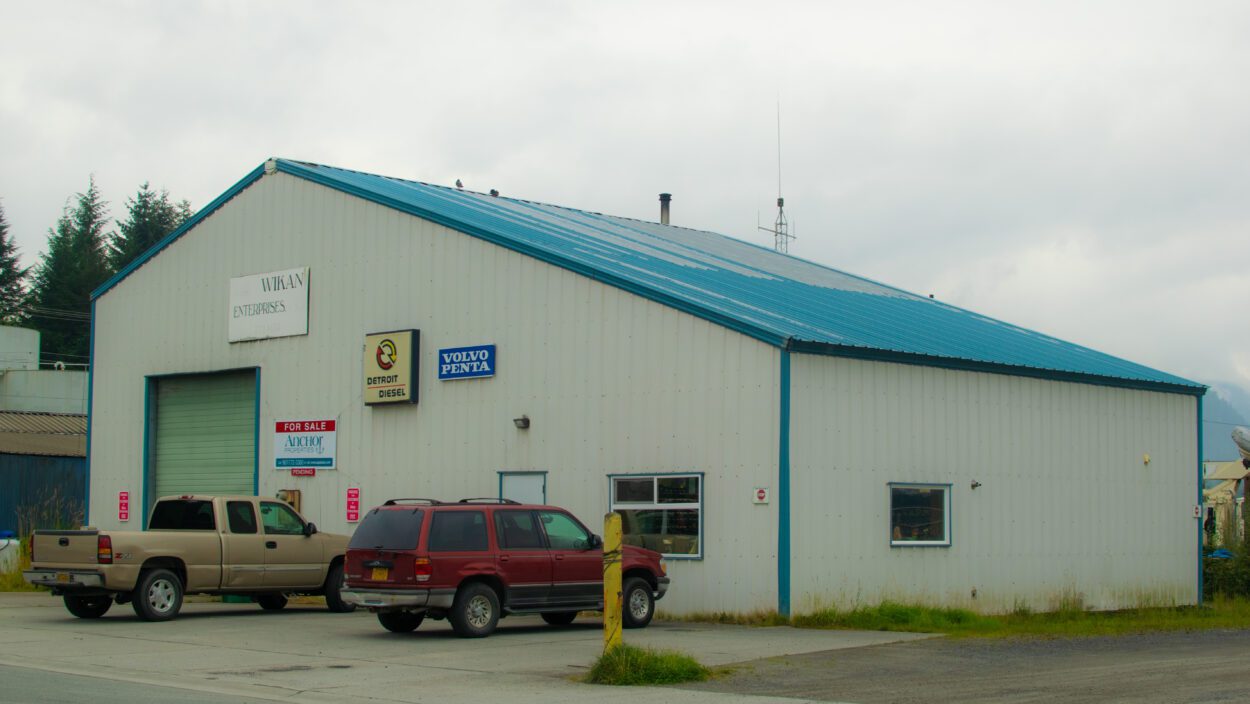
(Photo by Shelby Herbert/KFSK)
At last week’s meeting, Petersburg’s Assembly set a new precedent for the sale of Borough-owned tidelands. KFSK’s Shelby Herbert has the story on the marine diesel repair facility at the heart of the issue.
The owners of Wikan Enterprises Inc. have been in the game for over 30 years. Now, Sheri and John Wikan are looking to retire and sell their business. The thing is: they own the building at 103A Dock Street, but they don’t own the land beneath it. That’s because their property is leased through what’s called the Marine Industrial Park, which is managed by the Borough.
Now, the Wikan family’s potential buyers, Earl Warner and Hillary MacDonald, are having trouble securing financing because they can’t purchase the business outright. MacDonald says that’s because the banks don’t consider it a “real” property.
“The market value of the building, as we’ve learned through this process, is drastically reduced,” MacDonald testified at the August 21st Assembly Meeting. “While a bank will loan on a leasehold improvement — the value is not there. There’s a huge difference between the current market value as it stands, and the asking price, and what the Wikans need to get in order to retire how they planned.”
In order to offload their repair shop, the Wikans are petitioning to buy the land they’ve leased for decades. In her public testimony, Sheri Wikan asked the Assembly if holding onto the property is more important to them than any potential economic benefits to Petersburg — with special attention to their primary customers in the fishing industry.
“We have lost a lot of shipyard businesses to Wrangell, South Seattle, Bellingham and other small shipyards,” Wikan said in her public testimony. “Can Petersburg fishermen afford to lose more support to keep their fishing vessels running safely and efficiently?”
Assembly Member Scott Newman says the original concept of a leaseholder agreement already served its purpose — reserving the Marine Industrial Park for marine businesses. But now, he says, it doesn’t work for the community.
“I feel like the borough’s responsibility to the public is to encourage economic growth and not to inhibit it,” said Newman. “And I feel like we need to be in a good working relationship with our service providers — that includes an exit strategy for the people that have businesses to be able to transition and move on.”
Assembly Member Donna Marsh echoed Newman’s desire to encourage local business growth. She also said it’s important to her that the particular services offered by Wikan Enterprises prevail.
“We’ve got a critical business here,” said March. “[It’s] a diesel and marine shop, repair shop that I know when commercial fishermen are dead in the water — that’s it.”
Assembly Member Bob Lynn pushed back — saying it’s a slippery slope.
“I think we’re also setting a precedent because once we sell one, I see no reason that the Assembly should not sell all the rest,” said Lynn.
And that could mean the Borough won’t be able to collect rent on all the waterfront property that gets sold down the line. There are 11 other properties in this kind of arrangement, netting the Harbor Department around $160,000 a year.
Harbormaster Glorianne Wollen also has some reservations. She asked the Assembly to think about how the resolution could affect long term projects on the waterfront.
“There are several waterfront leases that are located within other harbor enterprise locations,” said Wollen. “I’m interested in how the assembly evaluates future development that sometimes takes decades to plan, versus immediate needs of an individual nestled within the property of the harbor that the harbor has interest in.”
The resolution to approve the Wikan family’s application passed — barely. Members Bob Lynn, Jeff Meucci, and Dave Kensinger all voted against it. With that part out of the way, the Assembly unanimously voted to exempt the sale of the land from public auction.











